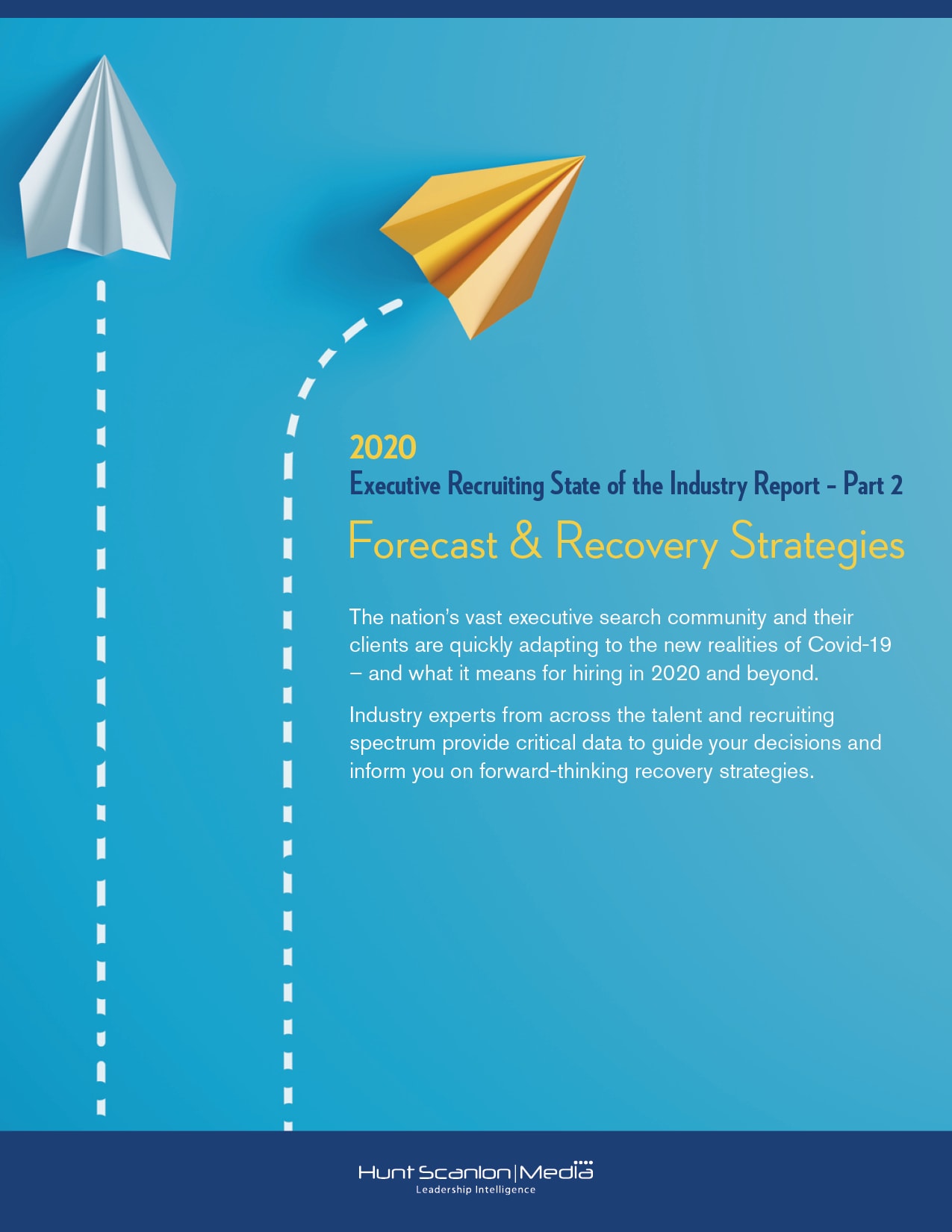Conducting a Job Search During a Global Pandemic

May 5, 2020 – Americans displaced by the coronavirus crisis continue to file for unemployment benefits in historic numbers sending millions of people looking for new jobs. With many organizations under hiring freezes, these are tough times to be seeking a new position.
“As we find ourselves in unprecedented times, many mid- to senior-level professionals are unsure how to proceed with their job searches,” said Amanda Sonis Glynn, an advisor within the career services division of Koya Leadership Partners, in the new report. In addition to executive search, Koya offers career advising services to help people design a strategy for achieving their career goals, polish a resume, prepare for interviews, and more.
 State of the Industry Report – Part 2
State of the Industry Report – Part 2
Forecast & Recovery Strategies
The nation’s vast executive search community and their clients are quickly adapting to the new realities of Covid-19 – and what it means for hiring in 2020 and beyond.
Hunt Scanlon’s latest executive recruiting industry sector report series will be available in 30 days. Hunt Scanlon Media will offer its two-part ‘Executive Recruiting State of the Industry Report’ focused on the Covid-19 pandemic and its aftermath. Part 1, ‘Adapting in Uncertain Times’ will examine how executive recruiters are resetting expectations in the midst of an unprecedented interruption to their business.
The part 2 installment, ‘Forecast & Recovery Strategies’ is our aftermath report – and provides critical data to guide your decisions and inform you on forward-thinking recovery strategies. Industry experts from across the talent and recruiting spectrum offer up their wide-ranging opinions, definitive viewpoints, and expert forecasts.
Many expect a significant pause in business, followed by a sharp rebound later this year. We talk to the experts, uncover the opportunities, pick the sectors and reveal how search firms and talent organizations are navigating and adapting in uncertain times. Buy Both Reports Now
The Koya report sheds light on what to do if you have been laid off during the COVID-19 pandemic and how to begin to look for a new position midst a global health crisis.
The first thing to recognize if you find yourself laid off is that you are not alone. “While that knowledge may not help alleviate the immediate concerns you are facing, knowing that you are not experiencing these challenges in a vacuum might help you connect with others and to feel less isolated during these unprecedented times,” Ms. Sonis Glynn said. “To be laid off during this crisis and to lose whatever your job has meant to you—an income and/or benefits, of course, but also a grounding point or a part of who you are—can make being laid off even more unsettling now than it might have been under different circumstances. That said, you can take steps both to maintain your professional identity and to move toward a new position.”
Sustain Your Network
People often think of networking as a way to find a job. While that may be the end game, it’s certainly not the starting point. “Beginning a conversation by asking someone if they have a position for you is not particularly effective, especially when an organization’s hiring status might be in flux,” said Ms. Sonis Glynn. “Instead, use this time to connect and reconnect with people who share your professional interests. Reach out to former classmates or colleagues, look for virtual get-togethers, and spend some time researching people and organizations you’d like to learn more about.”
Amanda Sonis Glynn joined Koya Leadership Partners after serving as a career advisor with Commongood Careers for eight years. Previously, she taught Sociology of Law and Future Philanthropists at Tufts University and worked as a seasonal career advisor with Harvard Law School’s Office of Public Interest Advising. During her career, she has worked closely with university, alumni/ae and community partners to develop fellowships, internships, networks, and opportunities for personal and professional development.
Ms. Sonis Glynn also said to inquire about how others are doing, how they and their organizations are handling the current situation, and how and where you might be able to add value. “Look for opportunities for reciprocity: What are you able to offer and what wisdom (or networking opportunities) might you be able to share? Not only will you be laying the groundwork for your search, you’ll be ensuring you have maintained good will with the people who will help you do your next job well,” she said. “Keeping your network warm, so to speak, will serve you well during this current time and for many years to come.”
Seek Pro Bono Opportunities
There are a number of organizations that would likely welcome pro bono assistance during these difficult times. “Offering your professional expertise on a pro bono basis will allow you to keep your skills and knowledge (and, as a result, your resume) up to date while also allowing you to contribute to mission and cause that is important to you,” said Ms. Sonis Glynn. “You’ll also be broadening your network in important ways: Not only will you meet more people in your field, but those with whom you work will see what you are capable of doing and who you are as a professional. When the organization hires (or knows of a similar organization that has an open position), you will be a known quantity and therefore top of mind for those making the hire. Be sure to update your resume and LinkedIn with any pro bono work.”
Related: The COVID-19 Impact on Executive Search
Serve as a Member of a Board or Volunteer
Volunteering with an organization or serving on a board provides similar opportunities to doing pro bono work but from a slightly different perspective. “Yes, you will still be expanding your network and allowing others to see how you work, but you’ll also be gaining valuable skills that will help you in your job search, particularly as a board member exposed to governance and other organizational management issues,” Ms. Sonis Glynn said. “Moreover, volunteering more generally is a fantastic way to try out skills that may be a little bit new to you or to spend some time with an organization about which you’ve always been curious. Have you wondered if you might want to pivot a bit in your career? This might be your chance to try out something new while benefiting a worthy organization.”
Update Your Resume and LinkedIn Profile
When is the last time you took the time and space you needed to update your resume or LinkedIn profile? “My resume is so old” and “I haven’t updated my LinkedIn profile in ages!” are common refrains, and anyone who has produced a resume or created a LinkedIn profile knows that doing so requires a lot of thought and hard work.
 Conducting Executive Searches During a Pandemic
Conducting Executive Searches During a Pandemic
When The Loring Group opened for business earlier this year, the future looked bright. Then came the coronavirus pandemic. Steve Caliger, the firm’s managing partner, talks about how his team is navigating the crisis, its impact on the search industry . . . and a silver lining or two.
“Figuring out what to include, how to prioritize information, and how to ensure that you are highlighting the accomplishments that best represent your core competencies and what you hope to do in your next role takes time,” said Ms. Sonis Glynn. “Giving yourself the space to update your resume and your LinkedIn profile now will be helpful in your networking efforts and will ensure you have a strong foundation to work from when you apply for a position and need to tailor materials accordingly (and quickly!)”
Identify Growth Sectors
While a number of sectors may be slowing down, the Koya report said that there are some that may actually be ramping up. “The shifts in our world may mean that some organizations will find their services to be in greater demand than before and will therefore be doing additional hiring,” Ms. Sonis Glynn said. “Read news sources related to your sectors to gain an understanding of what’s happening more broadly, and where growth trends may be pointing. How do your experiences match up with those needed in these industries? Spend some time identifying your transferable skills and thinking about how best to articulate them both in conversation and in writing.”
Apply for Jobs
There is a huge range in how organizations are handling the effects of COVID-19 on their hiring. Some are experiencing hiring freezes, but many are continuing to move forward with their hiring, and some are even speeding up their hiring processes. Ms. Sonis Glynn said that “if you hear or see of open positions, don’t hesitate to apply! Even if a particular position doesn’t work out—for whatever reason—it is always a good thing to make yourself known to hiring managers who work in your field.”
Develop New Skills
One of the positive consequences of social distancing is the increase in virtual learning opportunities, many of which are being offered free of charge. Many of us have said over the years that there are certain skills we’d like to improve on, subjects we’d like to learn more about, or gaps in our professional experiences that we would like to try to fill with additional education. Ms. Sonis Glynn said that now is a great time to take advantage of the breadth of classes being offered online.
“It’s fair to say that 2020 hasn’t gone the way we expected or hoped so far, and it’s fair to say that there are a lot of unknowns ahead—but it’s also fair to say that there are things that we can control, opportunities that are available, and connections that we can make as we face these challenges together,” Ms. Sonis Glynn said. “If you’ve been laid off, you may understandably be experiencing a great deal of stress and anxiety about your financial situation and your ability to find a new job. By following some of the steps outlined here, you can begin to regain some control over your situation and lay the groundwork for landing a new role.”
Related: The Future of Work and the Workforce in the Post-Pandemic Era
Contributed by Scott A. Scanlon, Editor-in-Chief; Dale M. Zupsansky, Managing Editor; and Stephen Sawicki, Managing Editor – Hunt Scanlon Media











